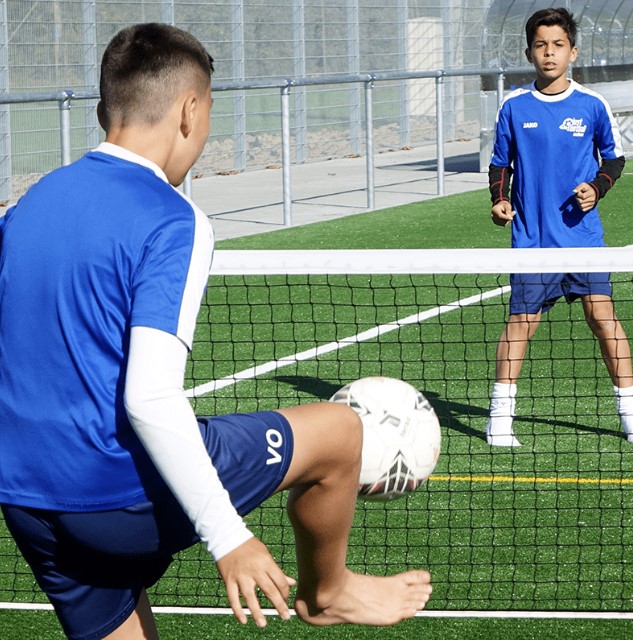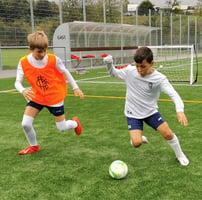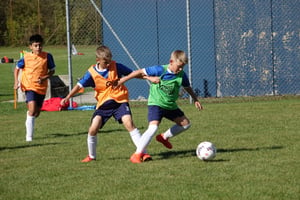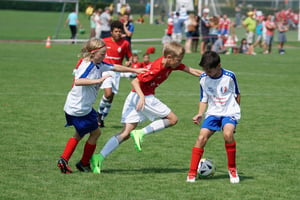Children can give free rein to their creativity in 1 vs. 1 games. In direct duels, they playfully...
Train according to the DFB recommendations: Joy - Intensity - Repetition for all players
Millions of fans love football because it combines skill with strategy and physical presence, because goals scored and special actions trigger great emotions. Football is simple and complex at the same time - you can play it anywhere with little equipment, achieve a high technical level and be successful with clever tactics. With good and age-appropriate training, even children can acquire qualities that will help them throughout their lives in team sports and may one day turn them into professional footballers. As the largest association, the German Football Association (DFB) has published recommendations for the training of children and young people, which coaches can use as a guide to check and optimize the quality of their own training.
The recommendations for DFB training aim to produce players who are competent in all aspects of football. Training integrates elements such as technical skills, tactical awareness and physical fitness. This is especially true for children and youth training, which should be interesting and exciting so that children develop a long-term passion for football as they develop their skills. All training sessions follow the principle of fun - intensity - repetition. The training is structured with a 4 to 5-block system, consisting of an activation block (dribbling tasks plus catching games or racing games), game block 1 (small game forms), technique block (technique tasks such as dribbling, passing, shooting) and game block 2 (small football games). The recommendations set clear time limits for each training block: 15-30-15-30, i.e. 15 minutes activation block, 30 minutes game block 1, 15 minutes technique block, 30 minutes game block 2. The DFB training is therefore structurally similar to the recommendations made by our team of experts at Coaching Zone for effective training for children and young people.

Important football training exercises for children and young people
1. Ball control exercises
To learn the basics of football, you first need to master the ball. Children improve their skills in handling a football ball by getting used to handling and playing it many times in different ways. Children should practice with different balls to get used to the rolling, bouncing and flying properties of the ball, e.g. light balls, mini balls, plastic balls, soft balls, tennis balls, reflex balls, small and large balls.
Dribbling with pylons and mini goals: For example, distribute pylons in a small field with mini goals and let the players dribble through the forest of pylons and shoot at the goals. Make sure they control the ball and change direction quickly. The children and young people are free to try out feints with the ball. After a while, 1-2 defenders can guard the mini goals.
Juggling: In a small field with 2 youth goals with goalkeepers, the players juggle freely with the ball and are allowed to shoot volleys at a goal every 30 seconds. This exercise helps to improve coordination, concentration and feel for the ball.
2. Fitting and pick-up and drop-off
Taking the ball on and with you and thus gaining space is often crucial. Always make sure that the ball is not brought to a standstill, but is taken along in the movement, ideally in the direction of play.
Rondo with game shape: In a round field with 4 mini goals, a rondo is played 4 against 2 for possession of the ball. If 4 passes are successful, this becomes a 4-on-2 attack on 2 mini goals. When the ball is won, the 2 defenders counterattack in 2 vs. 4 on the other goals. This exercise improves the accuracy of passing and first contact.
Wall passes with goal closure: The players stand in front of a wall with a goal with a goalkeeper behind them and pass the ball against the wall. At the coach's command, they take the ball in the direction of the goal and shoot. By passing against the wall, the players learn to play and receive the ball with different sides of the foot. The take-away is combined with a shot on goal.
3. Small pitch games
Small-sided games are the basis of good children's and youth training at the DFB. They are a key part of every training session and allow players to practise their skills in a competitive environment. Small sided games can provide plenty of playing time, lots of ball contact and mimic real game events.
2 vs 2, 3 vs 3 or 4 vs 4 games: Small sided forms of play promote good technical training through lots of contact with the ball, quicker decision making and a better sense of space and positioning.
Outnumbered games on goals: Small outnumbered games on goals in 2 vs. 1 or 3 vs. 2 promote cooperation, communication and an understanding of strategy. The defenders are allowed to counter-attack when they win the ball.
4. Fitness and mobility
Physical fitness is of great importance for young athletes. Exercises for endurance, speed and agility, which do not put too much strain on the growing body, are included in DFB training, but are always combined with interesting competitions or a goal finish.Ladder exercises: Players improve speed, agility and coordination through various footwork patterns (such as high knees, side steps) with an agility ladder. At the end of the exercise course, a goal finish or a pass into a mini goal can take place.
Relay races: Encourage exciting and challenging relay race activities that include speed, changing direction and dribbling the ball. This helps to build stamina and speed. A competition with several teams provides additional motivation for children and young people.
Conclusion
In summary, it can be said that the DFB recommendations for training emphasize the principle of enjoyment - intensity - repetition and thus develop techniques, endurance and understanding of the game in particular. It is a complete program for the football development of children and young people in all age groups with small game forms and a lot of playing time as the basis for good training. The DFB's principles are similar to the recommendations that our team of experts at Coaching Zone have developed for effective training with children and young people.



